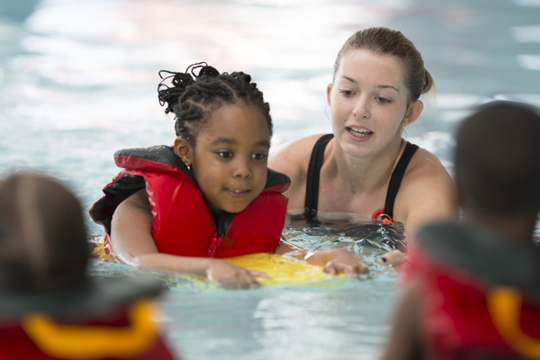Autism Spectrum Disorder: Swim Lessons Are Important for Safety and Survival
Of all the challenges parents of a child with autism face, making sure they’re safe around the water is probably not top of mind. However, it should be. A new study reveals that children with autism are at a much higher risk for drowning than other children.
Researchers from the University of Columbia’s Mailman School of Public Health analyzed the death records of over 32 million people. They discovered that children with autism are 160 times more likely to die from drowning than the general pediatric population.
This leads many autism specialists to believe that swim lessons are just as important as early intervention services after an autism diagnosis. They urge parents to teach their children with autism to swim – or find a qualified instructor – so they know basic water-safety skills and have the ability to get themselves out of a lake or pool if they fall in.
"All children, but especially children with autism, benefit from swim lessons," says Donna Phillips, a swim instructor at the Healthplex® Sports Club, who works with children who have autism and developmental delays. "It helps them to appreciate the joys of the water and develop a healthy respect for its potential danger."
Why Are Kids with Autism at Greater Risk for Drowning?
It’s not autism itself that creates the increased risk, but one of the other conditions that commonly occurs with autism. These include medical and psychiatric issues such as ADHD, epilepsy, anxiety and depression.
“Another behavior common to children with autism is the tendency to wander away from their parents, which can increase their risk for accidents,” says Nandini Iyengar, M.D., director of Developmental Pediatrics for Crozer-Keystone Health System. “Nearly half of all children with autism exhibit wandering behavior, and the likelihood of wandering increases with autism’s severity.”
Wandering is, in some ways, a form of communication for the child with autism who may not be able to communicate in another way. It’s a way of finding something they are interested in or escaping from a stressful situation.
When they wander, many children with autism seek out water sources. Researchers speculate water has a calming effect and may also offer the sensory stimulation – sights, sounds, feeling, and smells – that children with autism desire. The danger happens when they wander into water and don’t have the swimming skills to get out, or the communication skills to cry for help.
The Keys to Preventing Accidents
It’s impossible to prevent every accident before it happens, but taking preventive measures can help reduce your child’s risks.
"Teaching children skills like flipping over on their backs can be a lifesaver if they fall in the water," Phillips says. "This can be a challenge for kids with autism who may not want to have their faces or ears in the water because it can overwhelm their senses. Swim lessons can help them acclimate."
If you have a child with autism, the following strategies can help ensure their safety:
- Teach water safety: Swim lessons provide the basic skills a child with autism needs. The National Autism Association provides a list of swimming programs for children with special needs. They can accommodate the unique sensory challenges common to kids with autism.
- Secure your home and property: Help prevent wandering by installing locks, home alarm systems, and a fence around your yard.
- Alert your neighbors: Inform your neighbors about your child’s tendency to wander, especially if your neighbors have a pool. Extra sets of eyes will be helpful.
- Use a medical ID bracelet or tracking device: If your child has difficulty communicating, a medical ID bracelet with their name and contact information can help if they wander or get lost. Placing a small tracking device in your child’s pocket or backpack can help pinpoint their location.
“Many children with autism can't tell you what they're afraid of, and they may not even know themselves," Iyengar says. "Swim lessons build their comfort with the sensory input they get from the water. I’ve also seen swimming help them to build confidence in other areas of their lives."
If your child has autism, talk to your doctor or early intervention specialist about additional safety strategies that may help.
About Crozer Keystone Staff
Crozer-Keystone Health System’s physicians, specialists and advanced practitioners are committed to improving the health of our community through patient-centered, quality care across a full continuum of health services. Crozer Brinton Lake is Crozer-Keystone’s comprehensive outpatient care facility in western Delaware County, offering primary care, specialty services, outpatient surgery and advanced cancer treatment. Contact us: 300 Evergreen Drive, Glen Mills, PA 19342 http://www.crozerkeystone.org/Brinton-Lake 1-855-254-7425
- Web |
- More Posts(131)



Comments